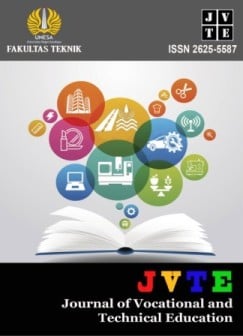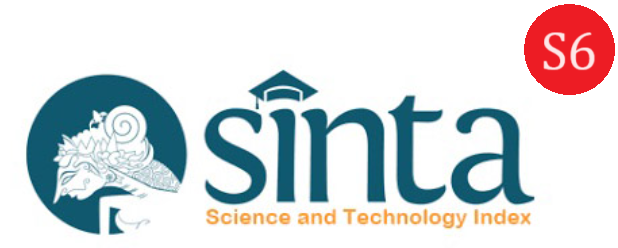PENGEMBANGAN PERANGKAT PEMBELAJARAN PNEUMATIK & HIDRAULIK BERBASIS MASALAH YANG BERORIENTASI KETERAMPILAN SIAP KERJA
DOI:
https://doi.org/10.26740/jvte.v2n2.p18-28Abstract
ABSTRAK
Perkembangan teknologi peralatan berbagai proses produksi di dunia industri mengalami kemajuan yang pesat, terutama mesin-mesin maupun peralatan-peralatan yang menggunakan teknologi pneumatik dan hidraulik. Hal ini akan memberikan konsekuensi, bahwa tenaga kerja yang mengoperasikan (operator) dan memelihara (maintenance) peralatan di industri harus kompeten dan memahami secara detail tentang mesin dan peralatan yang digunakan agar produksi berjalan optimal dan kesalahan (error) dapat diminimalkan. Untuk menjawab tantangan seperti ini, maka dibutuhkan tenaga kerja yang mempunyai pemahaman dan ketrampilan (kompetensi) dalam mengoperasikan serta merawat berbagai mesin yang bekerja berdasarkan sistem pneumatik maupun hidraulik. Tujuan dalam penelitian ini yaitu tersusunnya perangkat pembelajaran Pneumatik dan Hidraulik berbasis masalah berupa modul ajar dan trainer kit yang berorientasi ketrampilan siap kerja. Dalam praktik pembelajaran nantinya mahasiswa diberikan modul yang didukung dengan trainer. Selanjutnya berdasarkan petunjuk pelaksana di lembar kerja mahasiswa melakukan kegiatan menggambar rangkaian sistem penumatik dan hidraulik dengan software FluidSIM-P3 kemudian dipraktikan pada papan trainer. Metode penelitian yang digunakan dalam penelitian ini mengacu pada pengembangan model 4-D yang terdiri dari tahap pendefinisian (define), tahap perancangan (design), tahap pengembangan (develop) dan tahap penyebaran (desseminate). Pada penelitian tahun pertama ini diperoleh perangkat pembelajaran pneumatik dan hidraulik berbasis masalah yang berorientasi keterampilan siap kerja berupa modul dan trainer pneumatik yang sudah di validasi dan diujicoba secara terbatas di Jurusan Teknik Mesin FT UNESA. Berdasarkan hasil validasi, modul yang dikembangkan termasuk kategori baik (3,21). Berdasarkan hasil uji coba secara terbatas didapatkan rata-rata hasil tes belajar produk (kognitif), ketuntasan klasikal mengalami peningkatan dari 5,56% menjadi 100%. Selain itu, rata-rata hasil tes belajar proses (psikomotor) diperoleh 100% ketuntasan klasikal. Berdasarkan angket respon, secara keseluruhan perangkat pembelajaran yang dikembangkan 100% mahasiswa menjawab menarik dan sebagai media pendukung dalam perkuliahan sehingga mampu memotivasi mahasiswa mengikuti perkuliahan (96%).
Kata Kunci: perangkat pembelajaran. pneunatik, hidraulik, pembelajaran berbasis masalah
ABSTRACT
The development of equipment technology for various production processes in the industrialized world has progressed rapidly, especially machines and equipment that use pneumatic and hydraulic technology. This will have a consequence, that the workforce who operates (operators) and maintains (maintenance) equipment in the industry must be competent and understand in detail about the machines and equipment used so that production runs optimally and errors can be minimized. To answer challenges like this, it requires a workforce who has understanding and skills (competence) in operating and maintaining various machines that work based on pneumatic and hydraulic systems. The purpose of this research is the preparation of problem-based Pneumatic and Hydraulics learning tools in the form of teaching modules and trainer kits oriented to work-ready skills. In the learning practice, students will be given modules that are supported by trainers. Furthermore, based on the implementing instructions on the worksheet the students carried out the activity of drawing a series of pneumatic and hydraulic systems with the FluidSIM-P3 software then practiced on the trainer board. The research method used in this study refers to the development of the 4-D model which consists of the define stage, the design stage, the develop stage and the deseminate stage. In this first year research, problem-based pneumatic and hydraulic learning devices that are oriented towards work-ready skills were obtained in the form of modules and pneumatic trainers that have been validated and tested on a limited basis in the Department of Mechanical Engineering, FT UNESA. Based on the results of the validation, the developed module was in a good category (3.21). Based on the results of limited trials, it was found that the average result of the product learning test (cognitive), classical completeness increased from 5.56% to 100%. In addition, the average results of the process learning test (psychomotor) obtained 100% classical completeness. Based on the response questionnaire, as a whole the learning tools developed by 100% of students answered interestingly and as supporting media in lectures so that they were able to motivate students to attend lectures (96%).
Keywords: learning media, pneumatic, hydraulic, problem based learning
References
[2] Basuki, Ismet. (2004). Pengembangan Buku Ajar Berbasis Kompetensi. Surabaya: UNESA.
[3] Carr MM, Reznick RK, Brown DH. (1999) Comparison Of Computer-Assisted Instruction And Seminar Instruction To Acquire Psychomotor And Cognitive Knowledge Of Epistaxis Management. Otolaryngol Head Neck Surg; 121: 430-434.
[4] Harris, R., Guthrie, H., Hobart, B., dan Ludnberg, D. (1995). Competency-Based Education And Training; Between A Rock And Whirlpool. South Yarra; Macmillan Education Australia.
[5] Nur, M. (2011). Model Pembelajaran Berbasis Masalah. Surabaya: University Press.
[6] Mardapi, Djemari. (1999). œPerformance Based Evaluation Bahan Lokakarya Tentang Performance Based Evaluation di Program Pascasarjana UNY.
[7] Margono, S. (1997). Metodologi Penelitian Pendidikan. Jakarta : PT Rineka Cipta.
[8] Sardiman.(2001). Perencanaan Pengajaran. Jakarta : Raja Grafindo Persada.
[9] Sudjana, Nana.(1990). Penilaian Hasil Proses Belajar Mengajar. Bandung : PT Remaja Rosdakarya.
[10] Vembriarto, St. 1985. Pengantar Pengajaran Modul. Yogyakarta: Yayasan Pendidikan Paramita.
Downloads
Published
How to Cite
Issue
Section
 Abstract views: 365
,
Abstract views: 365
, PDF Downloads: 498
PDF Downloads: 498






